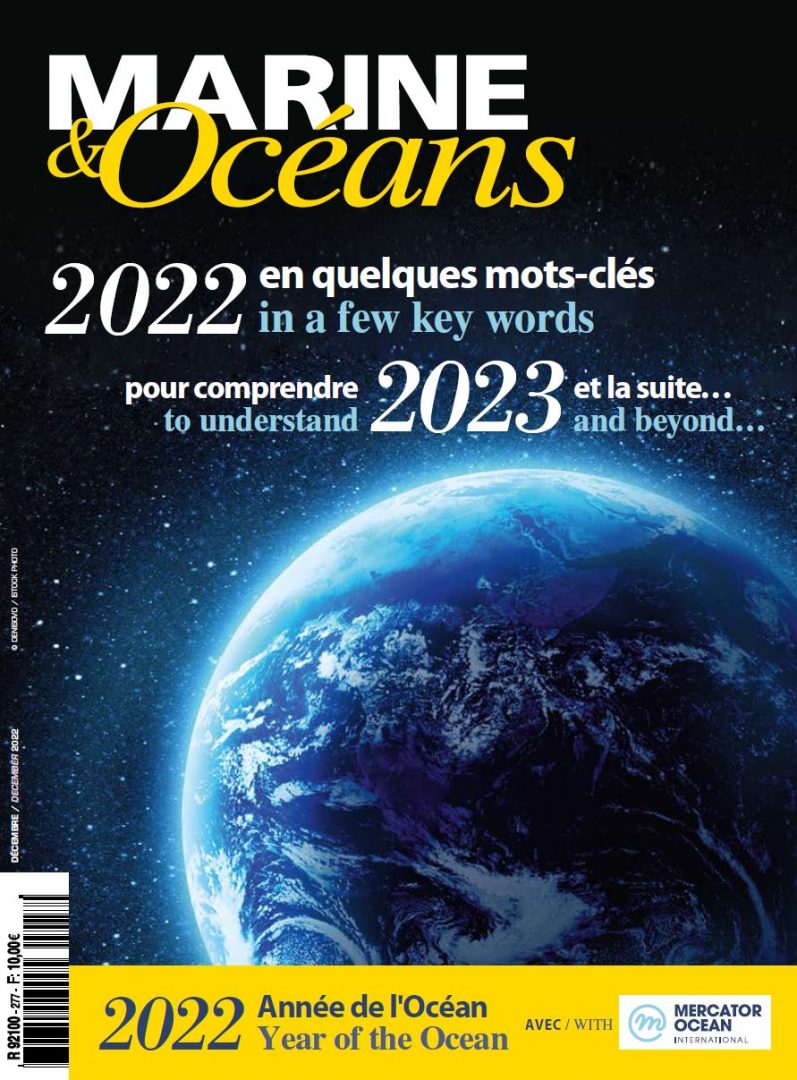It was time. High time. The year 2022, celebrating the fortieth anniversary of the adoption of the United Nations Convention on the Law of the Sea (1), has marked an important milestone in the vital awareness of ocean issues. Often forgotten in the major international negotiations on climate and biodiversity or in the treaties signed alongside COPs, the oceans have, at last, been brought to the forefront of the international political agenda. As the world’s largest maritime area, Europe has, somehow, regained some leadership on the issue.
And notably at the One Ocean Summit held in February in Brest, where representatives of States, civil society, companies and research came together, at the invitation of France, to make a collective commitment to the preservation of the Ocean. This was also the case, in Lisbon, at the end of last June, on the occasion of the second United Nations conference on the oceans, which brought together the international community around the 14th sustainable development goal – SDG14 (2).
This was again true in the framework of the United Nations Decade of Ocean Sciences for Sustainable Development (2021-2030), supported by UNESCO’s Intergovernmental Oceanic Commission (IOC). But the issue of the oceans also became a major concern last november at COP27 on climate, in Sharm El Sheikh (Egypt) and in december at the COP15 on biodiversity in Montreal (Canada). Meanwhile, still in 2022, the World Trade Organisation directly addressed the issue of damaging subsidies for overfishing, whilst the United Nations Environment Programme launched negotiations to put an end to the production of single-use plastic, one of the most devastating forms of pollution affecting the oceans.
Each time, France took the lead in encouraging or supporting these efforts, in a transparent, open and cooperative way, for the sake of the common interest of preserving the health of the Ocean. Because the Ocean is a crucial issue for all of us. Its role in global climatic, environmental and social balances, the importance of marine biodiversity for the health of the planet and the importance of ocean resources and spaces for all humanity make it a matter of constant collective concern.
But the challenges the Ocean has to cope with today require us to act together, on a large scale and without delay. We can no longer ignore the fact that our own future depends on its good state. In addition to climate change, ice melting, rising sea levels, changes in ecosystems, pollution and the degradation of biodiversity, our way of life, our food, our habitat and the integrity of our territories are all under threat.
The world’s leaders gathered in Brest, fully aware that the Ocean’s status on the international political agenda, is today neither in line with its role in the world’s climatic, environmental and social balance, nor with the threats to marine life, committed themselves to working collectively, rapidly and concretely to put a stop to its degradation. They decided to act for the preservation of biodiversity, to stop the overexploitation of marine resources, to fight against pollution and to mitigate climate change.
Yet, these efforts will only be successful if they are shared by all international actors and if they receive continued support at the highest level. We need to go further in acknowledging our collective responsibility, as stated in SDG14, to preserve and sustainably use maritime spaces. The One Ocean Summit led to the Brest Commitments for the Ocean. Commitments to protect its biodiversity and resources, to fight against pollution, to cope with the consequences of climate change, but also to learn more about it and make it a permanent priority on the global political agenda. A first assessment session was held in Lisbon in June, on the occasion of the United Nations Ocean Conference, and the first outcomes of this commitment are already visible. But it is essential to continue this mobilisation and place it on a long-term perspective.
For this reason, the Presidents of France and Costa Rica proposed to hold another United Nations conference on the oceans in France in 2025. This new international event will allow us to assess, in a very transparent way, the achievement of the MDG14, ten years after the Paris Agreement, and five years before the deadline of the 2030 Agenda.
Research and science
We should never forget that if we want to take the appropriate decisions to protect the Ocean, we must first learn about it. And this knowledge requires research and science. The current United Nations Decade of Ocean Sciences for Sustainable Development is a good illustration of the fundamental contribution of science to the proper governance of the planet. Similarly, the European Union is committed to developing an integrated model of the ocean, covering physics, chemistry, marine life and human activities.
This “digital twin” will allow for enlightened political decisions and the assessment of their effects, it will enable the development of the marine economy while respecting ecosystems and encourage dialogue with stakeholders and the public. For its part, UNESCO announced that at least 80% of the seabed would be mapped by 2030, compared with 20% today, at an estimated cost of five billion euros.
Hence there is a coherent approach between the scientific means deployed to improve our knowledge of the oceans, the decisions and choices made in favour of their sustainable use and, more generally, the proper global governance of the Ocean. None of these aspects can be effectively implemented without considering the others. We all need to be aware of this on a permanent basis: researchers, entrepreneurs, citizens, lawyers, users and decision-makers. This simultaneous mobilisation will be even easier to achieve if we keep in mind the risks associated with the continued deterioration of the state of the oceans.
These are issues that must be made a priority to preserve our living conditions in the medium and long term, rather than just immediate profits or particular interests. These are issues that raise the question of the appropriation of the oceans by the most powerful, whether States or companies, and that of the sharing of the benefits of resources between the different nations. They also address the problem of losses and damage resulting from the effects of climate change on the most fragile coastlines of countries that are both the least damaging but also the poorest and the most vulnerable.
This debate will be central to the Oceans Conference to be held in France in 2025. Until then, work, creativity and boldness will be needed. In this spirit and as a matter of clarity, the President of the French Republic expressed our country’s position on deep-sea mining at COP 27: a ban on mining, both in international waters (at the negotiations to be held in the coming months at the International Seabed Authority), and within our own territorial waters.
Indeed, should we decide to engage in such a project, whilst we cannot even assess the serious impacts of this activity on marine ecosystems? A position that we share with a growing number of countries, even though the issue seemed to be without much controversy a few months ago. Everything, including this issue of the deep sea, advocates the establishment, as is the case for climate and biodiversity, of a scientific platform that will provide us with indicators on the good or bad health of the oceans and will help decision-makers, whether they are heads of states or governments or CEOs of large companies, to finally… decide.
All this must be done together, in a different way, by inverting perspectives, by thinking of protection as the rule and not the exception, by giving, why not, a legal status to the entire hydrosphere system, including the oceans, the rivers, the glaciers and the poles. In Montego Bay, forty years ago, in the midst of the Cold War, nations managed to agree on the first treaty on the law of the sea. At that time, 4.5 billion inhabitants shared the Earth, the Sea. We will be twice that number in 2040. In a weakened multilateral world, we must do everything we can to deserve the achievements of those who paved the way.
* Special Envoy of the President of the Republic for the United Nations Ocean Conference.
- The so-called Montego Bay Convention signed in 1982
- “Conserve and sustainably use the oceans, seas and marine resources for sustainable development”


